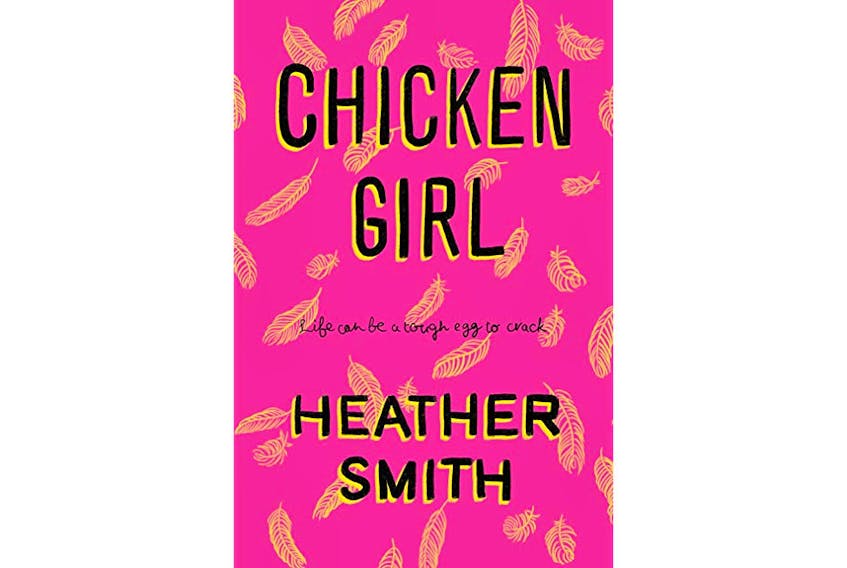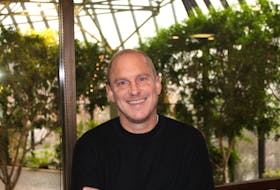Heather Smith’s young adult books are authentically, frankly, electrically contemporary; her protagonists grappling with anxiety, social expectations and isolation, parents in mental or actual prisons, and the urgent need to harness their own energies and hopes. They are really headed for trouble.
So the stakes are high as Poppy opens this narrative, speaking from a low point. And not just because she’s wearing a chicken costume. Her part-time, afterschool job is as a walking mascot for Chen Chicken. This requires her to walk up and down Elgin Street waving a sign proclaiming “Hot and spicy chicken wings, $8.99 a dozen.”

Not the type of employment that everyone would enjoy, but it’s perfect for Poppy. Because she’s in hiding. Since she was ten she has been deeply taken with the WW2- and post-war period.
It began with her house, on Churchill Street (her city is unspecified, but distinctly Canadian; a later evening includes watching Prime Minister Justin Trudeau’s apology to Indigenous People on the news), which is one of a set of planned designs originally constructed as living space for wartime factory workers, which now form their own architectural sub-community. “Discovering that I lived in a home built during the war sent my imagination souring. I became obsessed not only with wartime housing but with the whole era. It made me feel a longing, for what I didn’t know. Simpler times, maybe. I figured everyone was happier in the forties.”
To Poppy’s mind, that was a time when good and evil were clearly defined, and everyone united as one to vanquish the bad guys.
Things are murkier now. One very trenchant example is social media. Poppy’s love for the 1940s included fashion, and she styled herself with vintage full skirts and high-waisted shorts. She also idealized Rosie the Riveter, even posing as the icon, with the blue shirt and red bandana, sharing it with an online 1940s fan club.
Then someone took it and used it to fat shame her.
The anonymous bullying completely took the wind out of her sails. The only person who knows the reason for her withdrawal and sadness is her twin brother, Cam. They share a love of made-up words (“nonversation”) and ridiculous riddles. They have each other’s back. But even Cam isn’t fully aware of how down Poppy is.
She thinks she deserved the mocking. And she feeds this I’m-a-bad-person-in-a-bad-universe shame by watching awful, awful videos online.
But there’s a real world out there, there’s no shutting it out. Out in her chicken suit, she passes the time by trying some moves. When a little girl requests (of course) the Birdie Dance, she complies, thus meeting Miracle, six years old and, except for her stuffed toy, Gilbert, apparently alone. But Miracle says she has a mother, and several good friends: Lewis, Thumper, and Buck. And she wants Poppy to meet them, under the Fifth Street Bridge.
That Miracle is apparently skirting the social margins worries Poppy. But what can she do about it? She can’t even co-emcee the school’s closing day assembly with Cam, as they long planned. “Cam and I were the dynamic duo known for entertaining the students and teachers alike.” She’s also stopped showing up for roller derby with the Brawlipops, a sport she knows she’s physically and spiritually made for.
She calls Cam her “antidote to sadness,” and they are incredibly close and aligned as siblings. But she’s getting concerned about him, too. Cam came out in ninth grade, and flamboyantly so, leading that assembly, for example, in heels and lip-syncing Queen’s “Don’t Stop Me Now.” He’s having fun, but to Poppy he’s becoming one-dimensional: “It’s like how gay characters on TV can’t just happen to be gay – their homosexuality has to be part of some comedic shtick. Like that’s all they’re about as human beings.” For one thing, Cam has given up boxing, which he was talented at. Poppy urges him to be in the ring while wearing eyeliner, to play to all aspects of his considerable personality. For another, he’s taken his own part-time job, and Poppy has a bad feeling about Cam’s new boss.
Meantime, her own growing isolation does bring her to the bridge, where Miracle and her friends will open her eyes and mind and boundaries.
A sense of discovery infuses the writing. There’s a vibrancy here – partly because several of the characters dress with such quirky élan.
And it’s kinetic – partly because they are so physical, on and off the rink and school stage. Altogether there’s an immediacy to their personalities and predicaments, and it pays off in an engaging read.
Joan Sullivan is editor of Newfoundland Quarterly magazine. She reviews both fiction and non-fiction for The Telegram.
RELATED:









